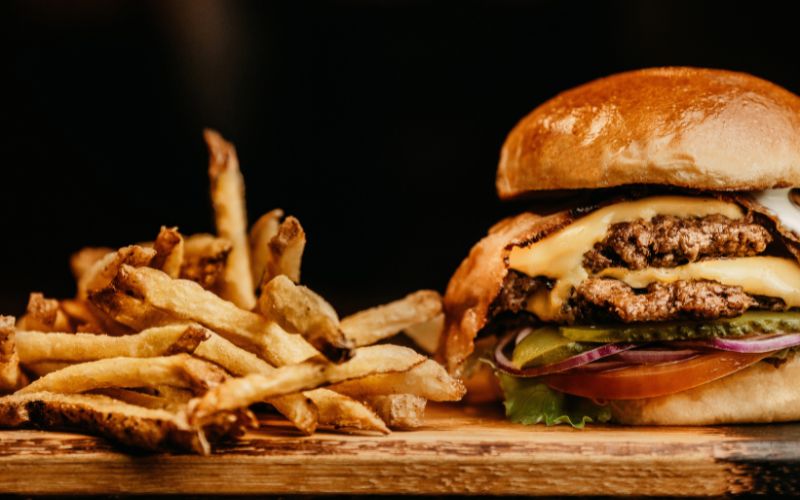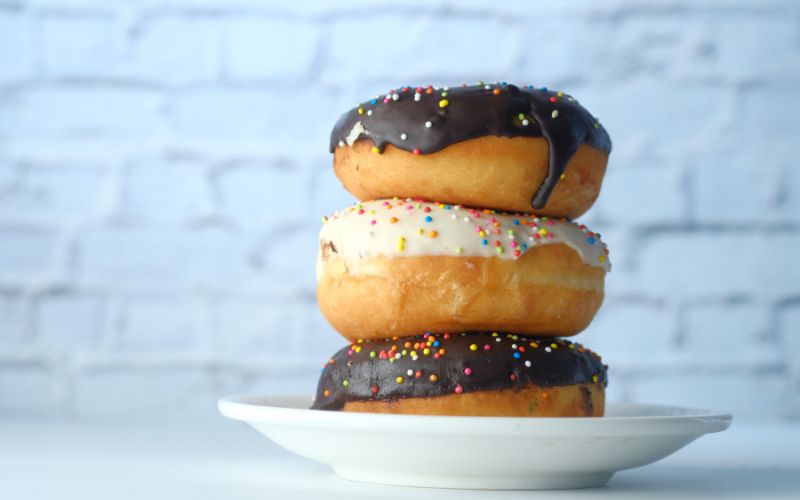Original Article | Medical News Today
For better sleep quality, it’s best to avoid foods high in fats and sugars, a new study confirms. CWP, LLC/Stocksy
- A study conducted by scientists from Uppsala University investigated the impact of a high-fat/high-sugar diet, also known as a junk food diet, on sleep.
- The researchers found that after consuming the unhealthy diet, the quality of deep sleep in participants worsened compared to when they followed a healthier diet.
- Although the duration of sleep and overall sleep structure were not significantly different between the two diets, the unhealthy diet was associated with reduced deep sleep quality and changes in some important sleep patterns.

Limited evidence exists regarding the influence of certain foods on sleep, leading researchers to conduct a randomised trial investigating the effects of a high-fat/high-sugar diet on sleep.
A new study, published in ObesityTrusted Source, aimed to gather intervention-based evidence by examining the impact of this diet on sleep patterns in healthy individuals.
The researchers found that after consuming the unhealthy diet, the quality of deep sleep in the participants worsened compared to when they followed the healthier diet.
A group of 15 healthy men took part in a study where they were given two different diets to follow. They were randomly assigned to either a high-fat/high-sugar diet or a low-fat/low-sugar diet for one week each.
After each diet, the researchers recorded the participants’ sleep patterns in a laboratory setting using a method called polysomnography, a sleep monitoring technique.
They looked at the duration of sleep, as well as the different stages and patterns of sleep, including things like oscillatory patterns and slow waves.

Using machine learning to analyze sleep
The study found that the duration of sleep was not significantly different between the two diets, as measured by both actigraphy — a method of monitoring sleep using a wearable device — and in-lab polysomnography.
When comparing two different diets, the researchers found that the structure of sleep remained similar after one week on each diet.
However, when they compared a diet high in fat and sugar to a diet low in fat and sugar, they noticed that the former diet was linked to lower levels of certain sleep characteristics during deep sleep.
These characteristics included delta power, which is a measure of slow brain waves, the ratio of delta to beta waves, and the amplitude of slow waves.
All of these changes suggested that the quality of deep sleep was reduced on the high-fat/high-sugar diet.
Dr. Florencia Halperin, chief medical officer at Form, a company that provides medical treatment for obesity and associated metabolic conditions, not involved in this research, told Medical News Today that “evidence has been mounting over the last decade about the relationship between sleep and metabolic disease.”
“Poor sleep adversely affects hormonal and metabolic parameters and increases the risk of weight gain and metabolic disease. At the same time, weight gain increases the risk of sleep disorders such as sleep apnea. So the relationship is very complex, and there is so much we still don’t understand.”
– Dr. Florencia Halperin
Limited sample size
Dr. Halperin pointed out that “the results suggested that consumption of an unhealthier [high-fat/high-sugar] diet results in changes to the pattern of sleep.”
“While the macro-architecture was not affected, changes in some sleep parameters observed (less relative power in delta frequencies and a lower delta to beta ratio) were consistent with a less restorative sleep state, as might be seen in an older population,” Dr. Halperin noted.
Kristen Carli, a registered dietitian nutritionist, also not involved in this research, highlighted a few limitations to the study, noting the small sample size of only 15 healthy young men.
“No women, older adults, or children were evaluated meaning that these results should not be extrapolated to the general population,” Carli pointed out.
Dr. Halperin agreed, saying that “we must keep in mind only 15 people were studied, they were all men, and only studied for 1 week — so we will need further research to validate these findings.”
Unhealthy diet may impact sleep patterns
However, Dr. Halperin noted that “this study is important and relevant to patients and the public because it provides novel insight into how lifestyle factors such as the diet we consume affect our sleep, which in turn affects our overall health.”
“This is early evidence that a typical unhealthier diet may affect our sleep in very specific ways, and therefore our sleep-regulated health parameters, such as cognition and hormone secretion, which then modulate other effects on our health.”
– Dr. Florencia Halperin
Dr. Halperin explained that while the study helps to raise awareness about the relationship between sleep and overall health, the current findings are unlikely to impact medical practice at the current time, given the early nature of this research.
However, “I may share this research with [my patients] to educate them about the many many ways changing our diet can contribute to improved health — even without any weight loss!” Dr. Halperin said.
Carli pointed out that the “implications of this study are that the high-fat/high-sugar diet can impact sleep quality.”
Does diet impact sleep or vice versa?
“While the results of this one study should not be extrapolated widely, these results are not exactly surprising,” she added.
“Sugar has been shown to impact sleep quality in prior researchTrusted Source, as well as a high-fat diet. However, I will note many researchers pose whether the diet is impacting the sleep quality or the other way around. Regardless, as a registered dietitian, there are many other health benefits, besides sleep quality, to consider choosing a low-fat/low-sugar diet, including weight loss, heart health, chronic disease prevention, etc.”
– Kristin Carli
Ultimately, as Dr. Halperin explained, “this evidence suggests that a healthier diet might help us get healthier sleep.”
“Another way to look at it is that this is perhaps one more proof point that our parents were right after all — we all need to eat our veggies, and go to bed on time!”
